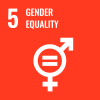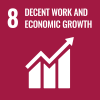Georgetown, 23 October 2023 – Despite having university degrees in biomedical and computer engineering and years of work experience in their home country, Venezuela, Mercedes and Nathaly found themselves having to accept off-the-books jobs in stores, offices and hospitals when they first arrived in Guyana in 2019.
Four years later, and managing their own company, ElectroBio, the two friends are determined to settle and explore their talents while contributing to the development of Guyana’s biomedical and technology sectors.
“We heard about life in Guyana from some friends, and we decided to take the regular route to settle in a country that could offer better opportunities,” recalled Mercedes, who traveled for three days with Nathaly from Caracas to Guyana’s capital, Georgetown, with only USD 20 between them.
“At that time, the price of basic goods and services in Venezuela were drastically high.”
“It was my first time leaving Venezuela,” said Nathaly, next to an open computer hard drive needing repair.

Mercedes poses with an Electrobio banner, a business that she started with a Venezuelan friend in Guyana. Photo: IOM/Gema Cortes

Nathaly fixing a device while talking to a client. Photo: IOM/Gema Cortes
Like many Venezuelans who left their country in recent years, Nathaly and Mercedes set their sights on being their own bosses, deciding to combine their efforts to start a small business providing biomedical services to hospitals and private companies, and fixing electronic devices like smartphones, computers and electric bikes.
“Having our own business gives us a much firmer foundation for developing our professional careers in our new country,” said Mercedes.
But it was not until they took an entrepreneurship course that they realized they could take their small business to the next level.
“The training opened our eyes and made us see that we could do more and grow more. It has really been fundamental for the business,” said Nathaly as she set up client appointments through a dedicated website.
Since 2020, the International Organization for Migration (IOM) has provided training courses on business skills, finance, marketing and seed funding in collaboration with Voices GY to help Venezuelan migrants and refugees in Guyana gain the skills to be self-sufficient while at the same time, contributing to their host communities. Thus far, the programme has helped around 150 entrepreneurs gain the skills they need not only to survive, but to thrive.
The programme stimulates entrepreneurial culture and is a successful example of migrants integrating into the local economy and society and serves as an example of the empowerment of agents of change.
“Facilitating access to the formal labour market gives migrants and refugees the opportunity to contribute consistently to the economies of host countries, participate in the growth of the labour force, boost the economy and better integrate in the country,” said IOM project assistant Fiona Stoll.
Much of IOM's work with Venezuelans across Latin America and the Caribbean is focused on integration – providing the tools people need to be self-sufficient contributors to their host countries. Entrepreneurship training provides the knowledge to sell products and services safely and legally and gain much-needed financial independence.

Mercedes, a Venezuelan computer engineer, fixing an electrical device. Photo: IOM/Gema Cortes

Nathaly fixing a computer hard drive, a role stereotypically filled by men in Guyana. Photo: IOM/Gema Cortes
“Our clients are surprised when they see that we are women in roles stereotypically filled by men. When I say that I fix their electrical devices, clients are very surprised and ask me if there is a mechanic. But any task a man can do can be done by a woman,” Mercedes said.
Arriving with only a few dollars in their pockets and overwhelming ambition to succeed, Nathaly and Mercedes have been able to gradually build a life in their new home – including learning a new language, English.
“We fell in love with the country since we arrived, and the Guyanese have been very welcoming and helpful,” Nathaly said.
“We want to continue to expand our business here in Guyana and also to become naturalized Guyanese citizens.”

General view along a street in downtown Guyana. Photo: IOM/Gema Cortes

Aerial of Guyana's capital, Georgetown. Photo: IOM/Gema Cortes
This story was written by Gema Cortes, IOM Media and Communications Unit, Office of the Special Envoy for the Regional Response to the Venezuela Situation.



